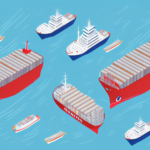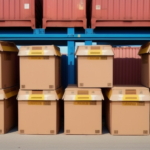Ensuring Compliance in Scaled Shipping Operations
In the shipping industry, compliance is a critical aspect of operations that cannot be overlooked. To operate a successful and sustainable shipping operation, it is necessary to comply with the numerous regulations and guidelines governing the industry. This article explores the significance of compliance in scaled shipping operations and how to develop an effective compliance strategy.
Why Compliance Matters in the Shipping Industry
Compliance ensures that shipping companies operate within the legal framework governing the industry, maintaining the safety and security of cargo, crew, and vessels. Regulations cover various aspects of shipping operations, including environmental protection, vessel and crew safety, and cargo handling.
Non-compliance with regulations can result in severe consequences, including hefty fines, legal action, and damage to a company's reputation. According to the International Maritime Organization (IMO), non-compliance can lead to accidents, injuries, and loss of life. Therefore, it is crucial for shipping companies to prioritize compliance and ensure that all employees are aware of the regulations and their responsibilities.
Moreover, compliance is not just a legal obligation but also a moral responsibility. The shipping industry plays a significant role in global trade and has a considerable impact on the environment. By complying with regulations, shipping companies can reduce their environmental footprint and contribute to sustainable development. Compliance also promotes fair competition and creates a level playing field for all industry players, regardless of their size or location.
Understanding the Different Regulations Governing Shipping Operations
The shipping industry is heavily regulated, with various regulations at the local, national, and international levels. The most important regulations governing shipping operations include the International Maritime Organization (IMO) regulations, the International Convention for the Safety of Life at Sea (SOLAS), the International Ship and Port Facility Security Code (ISPS), and the International Convention for the Prevention of Pollution from Ships (MARPOL).
IMO regulations are designed to ensure the safety and security of ships, crew, and cargo, as well as to prevent marine pollution. These regulations cover a wide range of issues, including ship design and construction, crew training and certification, navigation and communication equipment, and environmental protection measures.
SOLAS is an international treaty that sets minimum safety standards for ships engaged in international voyages. The treaty covers a wide range of issues, including ship design and construction, fire protection, life-saving appliances, and safety management systems. SOLAS also requires ships to carry certain types of equipment, such as lifeboats, life rafts, and distress signals.
MARPOL focuses on preventing pollution from ships caused by operational or accidental causes. It addresses issues such as oil pollution, sewage, garbage, and air pollution from ships.
Common Compliance Challenges Faced by Scaled Shipping Operations
Complying with shipping regulations can be challenging, especially for scaled shipping operations that span multiple countries and regions. The most common compliance challenges include a lack of awareness of regulations, language and cultural barriers, high cost of compliance, and a shortage of skilled personnel to manage compliance.
- Constantly Changing Regulations: Shipping regulations are updated frequently, making it difficult for companies to stay current. This can lead to non-compliance and penalties, which are costly for the company.
- Lack of Standardization: There is often a lack of standardization in shipping regulations across different countries and regions. This variability can complicate compliance management and increase the risk of errors.
- Resource Allocation: Allocating sufficient resources to compliance efforts can be challenging, especially for smaller operations or those operating in multiple jurisdictions.
The Risks of Non-Compliance in Shipping and Logistics
Non-compliance with shipping regulations can result in severe consequences, including hefty fines, legal action, damage to reputation, and loss of business opportunities. According to the World Maritime News, non-compliance can also lead to environmental damage, accidents, and injuries to crew and passengers, incurring significant liabilities.
- Supply Chain Disruptions: Non-compliance can lead to cargo being held up at ports or borders, causing delays in delivery and potentially impacting customer satisfaction. This can result in lost business and damage to relationships with customers and suppliers.
- Increased Insurance Costs: Insurance companies may view non-compliance as a higher risk and may charge higher premiums or refuse coverage altogether. This can add significant costs to a company's operations and impact their bottom line.
Developing a Comprehensive Compliance Plan for Your Shipping Operation
To ensure compliance, scaled shipping operations must develop a comprehensive compliance plan that addresses the specific requirements of their operations and the regulations governing them. The compliance plan should include a compliance policy, procedures, training programs, risk assessments, regular audits, and third-party oversight.
Key Components of a Compliance Plan
- Compliance Policy: Establish clear policies that outline the company's commitment to compliance and provide guidelines for adhering to regulations.
- Procedures and Protocols: Develop detailed procedures for various aspects of operations, ensuring that each step complies with relevant regulations.
- Training Programs: Implement regular training sessions to educate employees about compliance requirements and best practices.
- Risk Assessments: Conduct regular risk assessments to identify potential compliance risks and implement measures to mitigate them.
- Regular Audits: Schedule periodic audits to evaluate the effectiveness of the compliance plan and identify areas for improvement.
- Third-Party Oversight: Engage third-party experts to provide unbiased assessments of the company's compliance status.
Ensuring that all employees are aware of the compliance plan and understand their roles is crucial. Regular training sessions and communication of updates or changes to the plan help maintain a strong compliance culture within the organization.
Training Your Staff on Compliance Requirements and Best Practices
The effectiveness of a compliance plan is only as good as the staff responsible for implementing it. Therefore, it is essential to train staff on compliance requirements and best practices. Training programs should cover all aspects of compliance, including environmental, safety, and security regulations. Employees should also be trained to recognize and report non-compliance incidents promptly.
Ongoing education ensures that staff remain informed about the latest regulatory changes and industry standards. Interactive training methods, such as workshops and simulations, can enhance understanding and retention of compliance-related information.
Leveraging Technology for More Efficient and Compliant Shipping Processes
Technology can significantly improve the efficiency and compliance of shipping operations. Tools such as RFID tagging, GPS tracking, and electronic documentation streamline processes, reduce errors, and enhance compliance. Advanced technologies like predictive analytics and machine learning enable shipping companies to identify potential compliance risks proactively.
Blockchain Technology: Blockchain provides a secure and transparent way to track the movement of goods, ensuring compliance with regulations. It also reduces the risk of fraud and errors in documentation by maintaining an immutable ledger of transactions.
In addition to technology, training and education are essential for ensuring compliance in shipping operations. Employees should be trained on how to use new technologies effectively and understand their role in maintaining compliance.
Staying Up-to-Date with Changes to Regulations and Industry Standards
The shipping industry is continually evolving, with new regulations and standards introduced regularly. Staying up-to-date with these changes is crucial to ensure ongoing compliance. Shipping companies should dedicate resources to monitor regulatory changes, attend industry conferences and events, and collaborate with industry associations and regulatory bodies.
Subscribing to industry publications and newsletters provides valuable insights and updates on the latest developments. Additionally, leveraging technology to automate the monitoring of regulatory changes can help companies receive timely alerts when new regulations are introduced.
Proactive engagement with regulatory bodies and participation in industry forums allow companies to influence policy and stay ahead of compliance requirements.
Conducting Regular Audits to Ensure Ongoing Compliance
Conducting regular audits is an essential part of maintaining compliance in scaled shipping operations. Audits help identify non-compliance incidents, assess the effectiveness of the compliance plan, and uncover opportunities for improvement. Audits should be conducted by trained and experienced personnel and cover all aspects of compliance.
Ensuring that all relevant regulations and standards are met is a critical focus of audits. This includes not only industry-specific regulations but also environmental and safety standards. Comprehensive audits provide a thorough understanding of the company's compliance status and highlight areas needing attention.
Regular audits also build trust with customers and stakeholders by demonstrating a commitment to compliance and transparency. This can enhance the company's reputation and provide a competitive advantage in the industry.
Partnering with Third-Party Logistics Providers to Enhance Compliance Efforts
Partnering with third-party logistics (3PL) providers can enhance the compliance efforts of scaled shipping operations. 3PL providers offer specialized compliance expertise, technology solutions, and operational support. Before engaging with a 3PL provider, it is essential to ensure that they meet compliance standards and have a proven track record of adherence.
3PL providers can streamline the compliance process by assisting with documentation, labeling, and packaging requirements, ensuring that all shipments comply with regulations. This saves time and resources, allowing shipping operations to focus on other business aspects.
Additionally, 3PL providers can offer cost savings by leveraging their network of carriers and warehouses to negotiate better rates and optimize shipping routes. This results in lower transportation costs and improved efficiency for scaled shipping operations.
Case Studies: Successful Compliance Strategies of Leading Shipping Companies
Leading shipping companies have adopted various successful compliance strategies, including investing in compliance programs, developing a culture of compliance, and leveraging technology to enhance compliance.
Maersk: Maersk has invested in an extensive compliance program that includes a dedicated compliance team, comprehensive training, and regular audits. Their proactive approach ensures adherence to international regulations and fosters a culture of compliance within the organization.
Hapag-Lloyd: Hapag-Lloyd obtained ISO 37001 certification for its anti-bribery management system. This certification not only enhances the company's reputation but also provides assurance to customers and stakeholders of its commitment to ethical business practices.
By adopting similar strategies, other shipping companies can enhance their compliance efforts, build trust with stakeholders, and maintain a competitive edge in the industry.
Future Trends in Shipping Compliance and How to Prepare for Them
The future of shipping compliance is likely to be shaped by advancements in technology, increasing environmental regulations, and changing geopolitical landscapes. Shipping companies should prepare for these changes by allocating resources to research and development, investing in advanced technologies, and collaborating with regulatory bodies and industry associations to influence policy.
Emerging technologies such as artificial intelligence and blockchain will play a significant role in automating compliance processes and enhancing data accuracy. Additionally, stricter environmental regulations will require companies to adopt more sustainable practices and reduce their carbon footprint.
Changing geopolitical dynamics may lead to new trade agreements and regulations, necessitating agile compliance strategies that can adapt to new requirements swiftly.
In conclusion, compliance is a critical aspect of scaled shipping operations that cannot be overlooked. Shipping companies should develop a comprehensive compliance strategy tailored to their specific operations and the regulations governing them. Compliance should be an ongoing effort, involving regular audits, staff training, and staying up-to-date with regulatory changes and industry standards. By adopting successful compliance strategies and preparing for future trends, shipping companies can ensure sustainable and compliant operations.






















